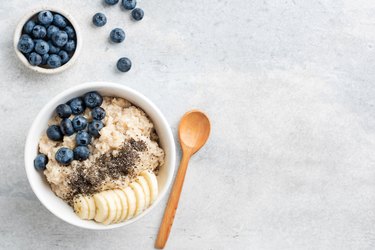
Oatmeal can be part of a healthy plan to gain weight, but you can also consume oats for weight loss. It sounds contradictory, but it's true. As long as you don't add sugary sweeteners, a bowl of oatmeal provides fiber and whole-grain carbs for energy without breaking the calorie budget.
Tip
Oatmeal can help you gain weight, but you can also consume oats for weight loss. A lot depends on what you add to your oatmeal, and your overall calorie intake.
Video of the Day
At the same time, when you pack in more calories and protein in the form of hearty toppings, oatmeal becomes a meal or snack that supports weight gain.
Video of the Day
Read more: The 4 Best Instant Oatmeals (and 5 to Avoid)
Oatmeal Calories and Weight
Whether you want to lose or gain weight, the total of calories in versus calories out determines your success. It takes 3,500 extra calories to gain 1 pound; conversely consuming 3,500 calories less than you use results in a 1-pound loss.
For both goals, long-term success is best achieved by gaining or losing at a slow steady rate of about 1 pound weekly, which you'll accomplish by adjusting your current caloric intake by 500 to 700 calories daily, according to Mayo Clinic.
Oatmeal works well for either goal because 1 cup of cooked oatmeal has 143 calories, according to the USDA. If you want to lose weight, you can add 1/2 cup of low-fat vanilla yogurt for sweetness and end up with less than 250 calories for breakfast.
On the flip side, the toppings you choose can add up to a bowl of oatmeal in the 700-calorie range. That's a good start when you plan to gain weight, but the big jump in calories also shows how a healthy bowl of cereal with calorie-dense mix-ins can result in unwanted pounds.
Oatmeal Works for Weight Loss, Too
If you love oatmeal but need to lose weight, you don't have to take it off the menu. Oatmeal is a good source of soluble fiber, and people who consume more fiber generally have less body fat, reported the Journal of Nutrition in July 2012.
As soluble fiber absorbs water, it expands in your stomach and makes you feel full, so it's easier to eat less. Fiber also slows down the movement of food through the digestive tract, which means you feel full longer.
Another benefit of soluble fiber is that it prevents a spike in blood sugar after you finish eating. When insulin is released to return high blood glucose back to normal, sugar levels sometimes swing in the opposite direction. Then you end up with a dip in blood sugar, which makes you feel hungry and may trigger overeating.
Conserve calories by keeping oatmeal toppings to a minimum — even those that are healthy such as nuts and yogurt. Avoid toppings that are nothing but added sugar, including honey, maple syrup and brown sugar. To limit added sugar, buy plain oats rather than flavored varieties.
Read more: What Is the Nutritional Value of Oatmeal?
Use Oatmeal to Gain Weight
Oatmeal makes a good breakfast, but it might do a better job of helping you gain weight if you use it as a snack. Its versatility lets you use it for several smaller snacks or as one bowl that significantly boosts calories with multiple healthy toppings.
For example, one-half cup of dried cherries contains 280 calories, according to the USDA. A 1/4 cup serving of walnuts has 200 calories, while 1 ounce of dark chocolate adds approximately 160 calories. Adding one serving of each — dried fruit, nuts and dark chocolate — creates a bowl of oatmeal with nearly 800 calories.
- Journal of Nutrition: "Filling America's Fiber Intake Gap: Summary of a Roundtable to Probe Realistic Solutions With a Focus on Grain-Based Foods"
- Mayo Clinic: "Metabolism and Weight Loss: How You Burn Calories"
- USDA FoodData Central: "Oatmeal, Cooked, Quick (1 or 3 Minutes), Fat Not Added in Cooking"
- USDA FoodData Central: "Yogurt, Vanilla, Low Fat"
- USDA FoodData Central: "Dried Cherries"
- USDA FoodData Central: "Walnuts"
- USDA FoodData Central: "Dark Chocolate"